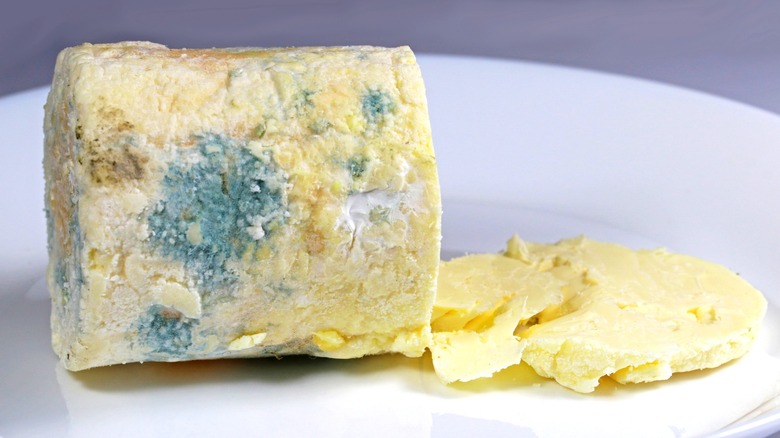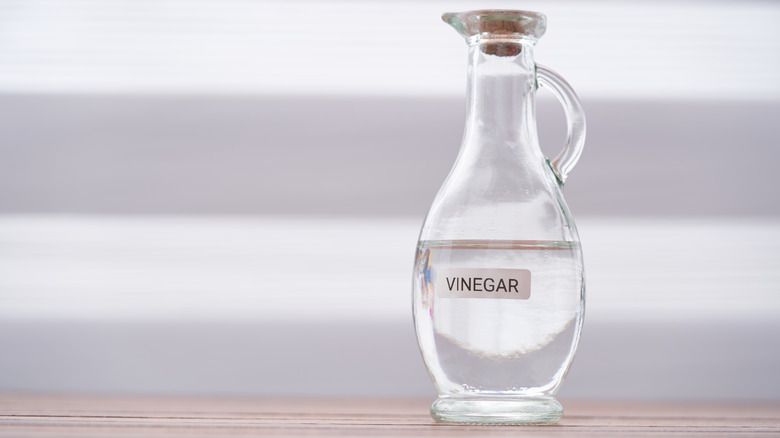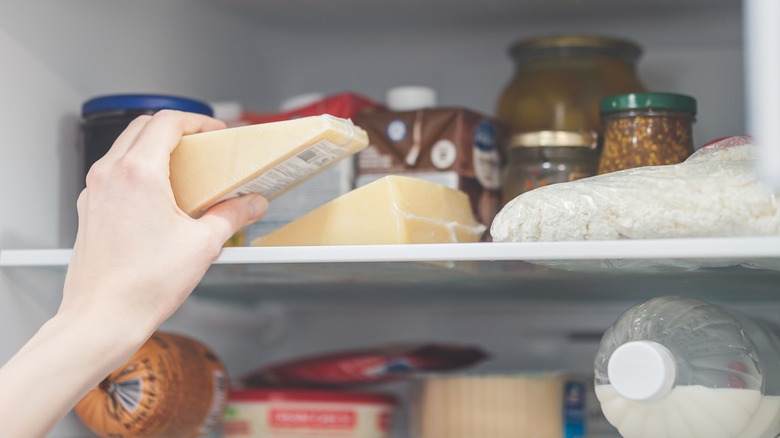The Vinegar Hack That Keeps Mold Away From Your Cheese
If you're into cheese, you know that having multiple types in your fridge isn't just a normal practice, but a necessary one. You never know when the hankering for a Gruyere grilled cheese is going to hit, or when you need to whip up a pot of cheddar mac and cheese or bacon-wrapped, blue cheese-stuffed dates. While a well-stocked cheese drawer is the stuff that dreams are made of, there is one caveat: It doesn't take long for cheese to start growing mold, if you don't eat it fast enough.
Sure, you can cut off the moldy parts of most hard or firm cheeses and eat the rest, but this isn't as viable for softer cheeses, not to mention some of us don't want to take the risk. It's a much better practice to keep track of what sorts of cheeses you have in your fridge, and how long they'll last before they start to degrade. To be even more proactive, ensure your cheese lasts as long as it's supposed to by breaking out a bottle of vinegar.
When you lightly dampen a paper towel with vinegar and wrap your cheese in it, then place it in a container or resealable bag, you can potentially keep mold at bay for weeks. Both apple cider and standard white vinegar will do the job, and these light vinegars shouldn't affect the taste of your cheeses at all.
How vinegar stops cheese from growing mold
Uneven storage temperatures and humidity are two key reasons why mold grows on cheese. Every time you open and close the door of your refrigerator, the internal temperature of the fridge — and the food inside it — goes up and down. When the cold conditions of your fridge warm up, condensation forms on the fridge's interior, and eventually its contents. This moisture can get trapped inside a bag or container of cheese, creating a breeding ground for fungus.
Distilled vinegar counteracts this process because of acetic acid, which gives the liquid its antifungal and antibacterial properties. These preservative effects come down to acetic acid's pH level. A pH level measures how acidic or alkaline a substance is (the lower the number, the more acidic). Mold grows in environments whose pH level ranges from 3.5 to 8.0. With a pH level of 2.5, vinegar is highly acidic, and adding it a cheese's environment makes it less hospitable to mold growth.
Think of the way pickling fruits and vegetables works: You soak them in a vinegar-based pickling liquid, which inhibits the growth of bacteria. A vinegar-soaked paper towel can work similar magic with cheese. This trick covers the cheese in a protective layer that resists fungal growth, while still letting the cheese "breathe." Submerging cheese in vinegar would alter the taste, making the paper towel trick both easier and more effective at keeping your favorite curds tasty and mold-free.
The vinegar trick works better on some cheeses over others
Some cheeses may not need any vinegar to prolong their shelf life. Hard cheeses like Parmigiano Reggiano and Pecorino Romano contain very little moisture, and since bacteria thrives on moisture, you can expect an opened package of these hard cheeses to last a good month or so in the fridge. Vinegar won't do much to benefit these already long-lasting cheeses. If you do see some mold forming on the surface, it's safe to scrape it off — mold has a hard time penetrating deeply into hard cheese.
The opposite is true for fresh or soft cheeses, like ricotta, fresh mozzarella, and cottage cheese. The high moisture in these varieties encourages mold growth, so if you notice discoloration on the surface, throw it away. Don't rely on vinegar or anything else to save these cheeses or make them last for a long while. Some varieties simply have to be eaten more quickly.
It's best to save the vinegar-dampened paper towel method for semi-hard cheeses like Monterey Jack, cheddar, and Swiss. If they are stored properly (like in cheese paper, for example), these popular cheeses will last in the fridge for a couple of weeks, but they can go for even longer with vinegar. Since these cheeses are pretty firm, you can scrape off surface mold without concern. However, if mold has formed on pre-sliced cheese, rather than bigger blocks, it's best to discard them.



